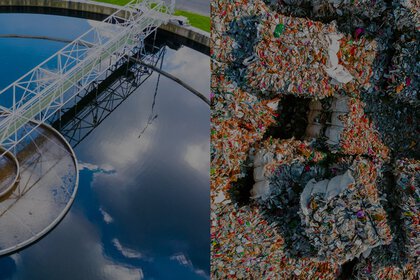Event program of IFAT Munich 2026
With its various event formats, IFAT Munich offers visitors the opportunity to experience industry topics and solutions live. From our themed stages to live demonstrations and competitions to our spotlight areas, there is something for everyone.

Solutions for the Environmental Technologies of the Future
Discover the full range of practical, forward-looking environmental technologies and solutions for water, wastewater, waste and the circular economy at IFAT Munich. From smart water supply to resource efficiency, recycling and energy – here you’ll find exactly the answers that will move your projects forward.
Blue Stage
Water is one of our most important resources - and its sustainable use is one of the great challenges of our time. How do we adapt our use of water to climate change? How does efficient maintenance of sewer networks work? How can water be reused without sacrificing quality? And is hydrogen produced in a climate-friendly manner the way forward? The event program of IFAT Munich offers you answers to these and other questions.

Orange Stage
Circular economy & resource efficiency, material flow management, logistics and mobility in municipal technology and waste management are the topics that will be highlighted on the Orange Stage.
How do we manage the transformation from a throwaway society to a holistic circular economy that considers the entire life cycle of products? Which solutions make a decisive contribution to this?
The program of events at IFAT Munich 2024—the world's leading trade fair for environmental technologies—offers you a comprehensive overview.

Green Stage
On the Green Stage, our exhibitors will show you not only ideas but also real products, solutions and innovations. If you would like an exclusive insight and get to know a company better, or are looking for a specific solution, then this is the place for you. Look forward to what our exhibitors will bring to the stage for you.

Solution Tours
Sought—found: On our guided solution tours you will steer straight to the stands that offer you the best overview of specific issues related to the topics covered by IFAT Munich. Stay tuned to see which topics we will be highlighting in 2026!

Spotlight Areas
In-depth insights: material flows in the cycle, innovation projects and the latest technologies...Did you know? Our Spotlight Areas offer valuable and exciting insights into current topics, technologies or material flows—concentrated expertise for sustainable use of our ressources.

IFAT Munich Cross-Industry Sessions
With the newly introduced Cross-Industry Sessions, IFAT Munich, in cooperation with various events at Messe München, is focusing on solutions from different sectors and industries. The aim is to address common problems across various industries in order to develop suitable solutions and approaches for a circular economy.

Live Demonstrations & Competitions
Pure practice: experience environmental technology live. The impressive live demonstrations on the outdoor exhibition grounds show innovative environmental technology in action. In addition, partners of IFAT Munich will be hosting exciting competitions.

Startup area: best of future
Experience innovation at the IFAT Munich Startup Area: future collaborations, profitable production processes, and special solutions.

The event program of IFAT Munich 2026
For IFAT Munich 2026, you will find all lectures, panels, live demonstrations, the partner program, and much more, including times and locations, in our detailed 2026 event program.
